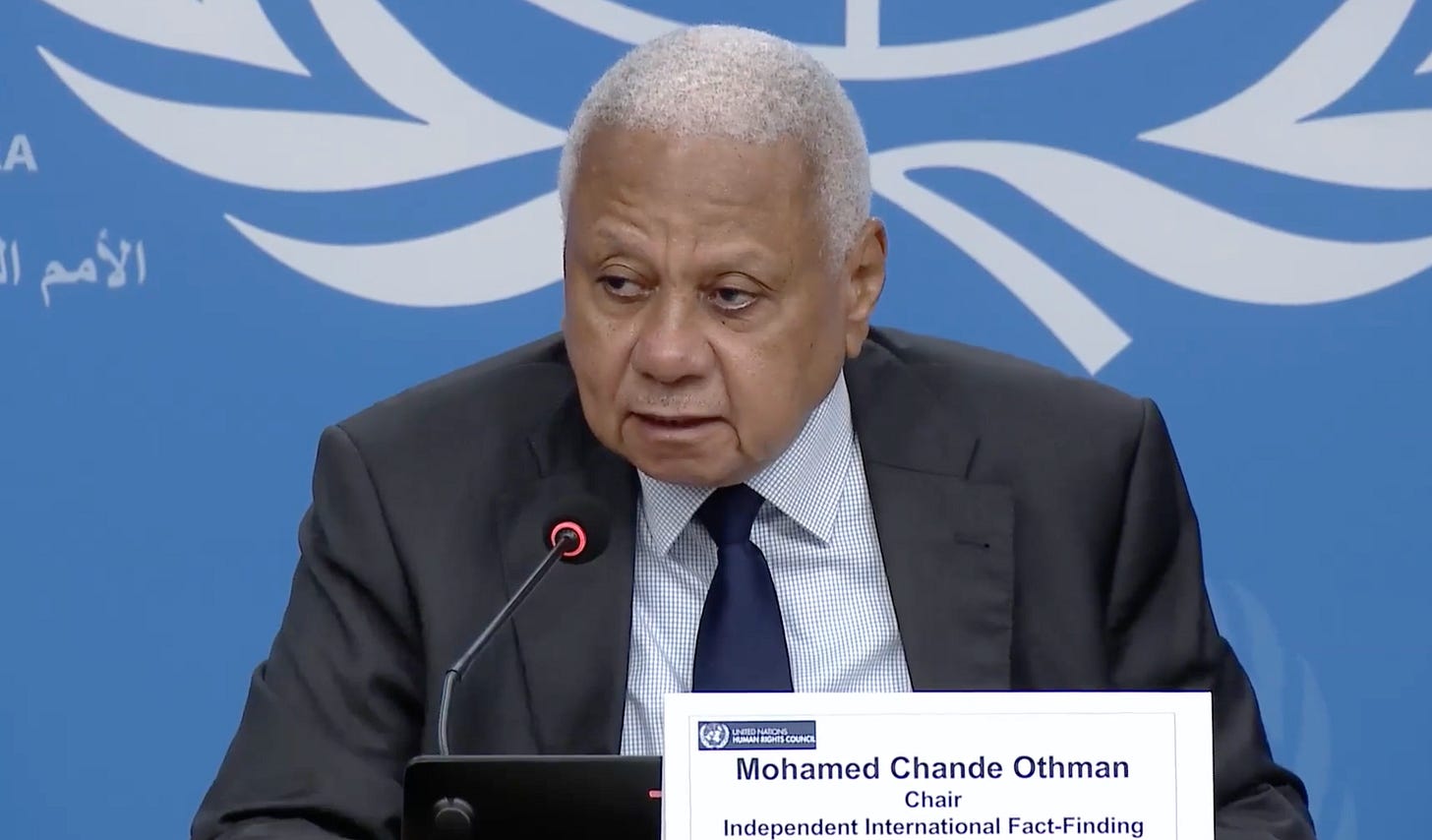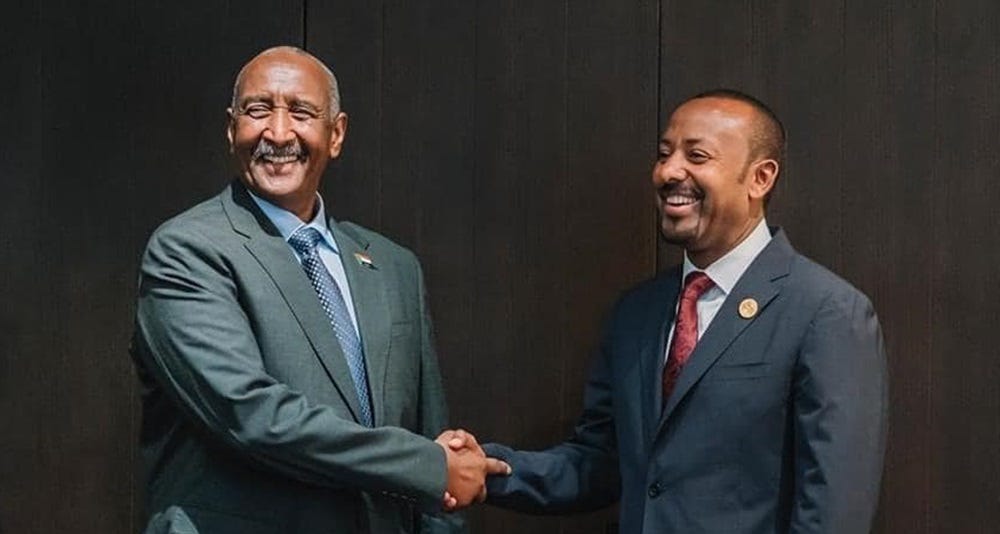UN panel says end impunity, hand over Bashir
Fact-finding mission issues report on Sudan war crimes
A fact-finding mission appointed by the UN Human Rights Council in Geneva says that a culture of impunity for human rights abuses and war crimes is one of the “root causes” of Sudan’s civil war, recommending that Sudan’s government hand over ousted President Omar al-Bashir, who is wanted by the International Criminal Court.
In a report released yesterday, the independent UN Fact-Finding Mission stated,
“The impunity gap in Sudan is among the key root causes of decades of continued violations. The Fact-Finding Mission recommends that the Security Council expand the jurisdiction of the International Criminal Court to cover the entire territory of Sudan. It also urges Sudan to cooperate with the Court through the surrender to it, of all indicted persons, including former President Omar al-Bashir.”
The UN panel further recommended creating additional accountability mechanisms, such ‘truth commissions,’ a reparations office, and a “separate international judicial mechanism working in tandem and complementarity with the International Criminal Court.”
Before the current civil war, Sudan’s warring parties both participated in previous conflicts in Darfur (2003-2020), South Kordofan and Blue Nile (2011-ca. 2020), and South Sudan (1983-2005), during which they committed war crimes. Additionally, they brutalized civilians during the street protests of 2018-2019, which ended Al-Bashir’s reign, resulting in a brief period of civilian rule until Al-Bashir’s former lieutenants took power again in a coup.
This history has emboldened the warring parties to perpetrate more war crimes during the current conflict, including targeted killings, indiscriminate bombing and shelling, rape, torture, arbitrary arrests, and mistreatment of prisoners.
The UN report concludes, “For peace to sustain in Sudan, there is a need for accountability. The Fact-Finding Mission considers that only a comprehensive transitional justice process with appropriately endowed mechanisms can address the impunity and justice gaps in Sudan and provide remedies and reparations for victims.”
The three-member UN panel is chaired by Mohamed Chande Othman, former chief justice of Tanzania. Its other two members are Joy Ngozi Ezeilo, a Nigerian law professor and former UN rapporteur, and Mona Rishmawi, a former senior UN official who played a leading role in a previous UN inquiry on Darfur. They were appointed by the UN Human Rights Council in October 2023 to investigate the situation in Sudan, identify root causes, and recommend accountability measures.
The panel carried out its work from January to August 2024. They visited Chad, Kenya, and Uganda, gathering first-hand testimony from 182 survivors, family members and eyewitnesses. They also consulted with experts and civil society members, who provided additional information to the UN investigators.
The chairman of the UN team said in remarks in Geneva,
“Our mandate requires us to examine the root causes of all alleged violations and abuses of human rights and international humanitarian law, and related crimes. We have so far identified a number of structural and systemic issues as well as those related to policies and conduct. These include the continued arming of civilians without meaningful control, the mobilization of militias and armed groups on an ethnic basis, and shielding from accountability those persons and entities responsible for atrocious crimes.”
“Some of these practices are being revived by the warring parties from past conflicts and are laying the ground for current and future cycles of serious violations. The national legal system appears unable to conduct prompt, independent and credible investigations or to prosecute persons in a manner consistent with international human rights norms and standards. It is therefore critical to combat impunity.”
The report also recommends imposing an arms embargo on all of Sudan and restoring an international force presence in the country (such as a UN peacekeeping mission or African Union mission) to protect civilians. Neither of these proposals are likely to be approved by the UN Security Council, though they might be considered by the African Union. An existing UN arms embargo applies only to the Darfur region and was never enforced. A nationwide arms embargo—or even the threat of one—could alter the course of the war by preventing the Sudanese army from reequipping and acquiring new advanced weapons, which it hopes will turn the tide of the war.
Sudan’s military government boycotted ceasefire talks hosted by the United States in Geneva last month. A delegation of the Rapid Support Forces showed up to the talks, as well as envoys of several countries, the African Union, and the United Nations.
Sudan’s military government is headed by former generals of the Bashir regime, while the Rapid Support Forces are headed by a notorious warlord from the Darfur region.
The former dictator, Al-Bashir, who ruled for nearly 30 years, spent the first year of the current civil war trapped at a military hospital in Omdurman. He left Omdurman after the Sudanese army broke the RSF siege of that part of Omdurman in February 2024. Because he suffers from cancer, Al-Bashir may be living in Merowe, which has one of the only cancer centers in Sudan that is still functioning.
Download the full report of the UN Fact-Finding Mission:
Al-Burhan meets Ethiopian prime minister in Beijing
Sudanese military leader General Abdel Fattah al-Burhan held talks with Ethiopian Prime Minister Abiy Ahmed on Wednesday during the China-Africa Forum in Beijing, marking a key diplomatic exchange amid the scramble for diplomatic recognition and support by the warring parties in Sudan.
The meeting, the first high-level interaction since Abiy’s visit to Port Sudan in July, was attended by senior Sudanese officials, including Acting Foreign Minister Hussein Awad and Sudanese Ambassador to China Omar Sadiq, according to a statement from Sudan’s Transitional Sovereign Council.
“The discussions focused on the strong relations between the two brotherly countries and explored ways to support and develop these ties for the benefit of both nations. They also addressed the recent developments in both countries and the broader region,” the Council said in its statement.
Abiy’s visit to Sudan in July aimed to mediate between the Sudanese Armed Forces (SAF) and the paramilitary Rapid Support Forces (RSF), despite mounting anti-Ethiopian sentiment in Sudan. Sudanese officials have accused Ethiopia of providing covert support to the RSF, an allegation that Addis Ababa has repeatedly denied.
Ethiopia has consistently advocated for peace in Sudan, with Abiy pushing for diplomatic negotiations to resolve the conflict that erupted in April 2023. The civil war, which has devastated the country, continues to intensify as RSF forces expand operations toward the Ethiopian border, raising alarm in Addis Ababa.
One particularly sensitive issue is the RSF's proximity to Ethiopia’s Grand Ethiopian Renaissance Dam (GERD), a massive hydroelectric project that has long been a source of contention with Egypt. RSF’s recent attacks in Blue Nile state near the Ethiopian region hosting the dam has sparked concerns in Ethiopia about potential sabotage, as any destabilization could threaten the country’s critical infrastructure.
The GERD, which Ethiopia views as vital to its energy future, has been a flashpoint in relations with Egypt, which fears the project could significantly reduce its share of the Nile waters. Ethiopia's diplomatic efforts with Sudan are seen as an attempt to prevent the broader conflict from dragging Egypt into the fray, particularly given recent developments in the Horn of Africa. Egypt may also be concerned about the possibility of large refugee flows across its western border.
Egypt has recently sent troops to Somalia under the guise of supporting the country in a maritime dispute with Ethiopia. Ethiopia fears that a similar deployment to Sudan could lead to direct Egyptian involvement in the Sudanese conflict, potentially destabilizing the region and posing a threat to its western border and the GERD itself.



